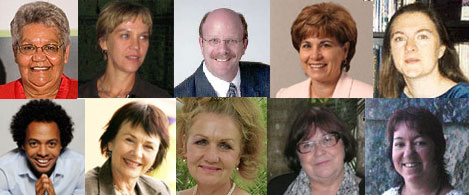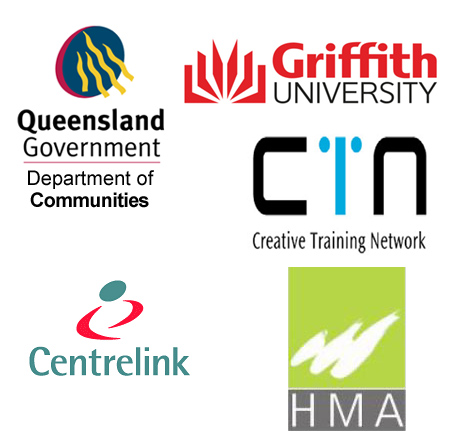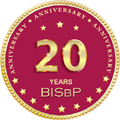Coping Resilience & Hope Building, Asia Pacific Regional Conference, Brisbane 9-11 July 2010

Key Speakers
Lorraine Peeters, Jasna Zečević, Michael D. Clark, MSW, Desley Hargreaves , Dr Sarah Melinda Dobie Buila, Tewodros Fekadu, Professor Lesley Chenoweth, Julie Wilson-Hirst, MA, Pamela Trotman and Leisha Townson
Venue: Nathan Campus Griffith University, Brisbane, Australia
Supporting Partnerships:
We gratefully acknowledge the supporting partnerships received from

Conference Overview
The Coping, Resilience & Hope Building: Asia Pacific Regional Conference is dedicated to exploring the remarkable capacity of human resilience in the face of adversity. As individuals, families, communities, and societies encounter challenges, the conference seeks to advance evidence-based practices that foster resilience and cultivate hope.
Building on the momentum of the 2009 Dubrovnik Coping & Resilience Conference, this event—organized by the Brisbane Institute of Strengths-Based Practice—will serve as a dynamic platform for dialogue and collaboration among professionals across disciplines and regions. With a focus on the interplay between individual, familial, community, and societal responsibility in resilience-building, the conference aims to inform future practice, research, and policy.
A wide range of contributions, including academic papers, practice-based presentations, and personal narratives, will highlight strengths-based approaches being implemented around the world.
The conference is expected to attract a diverse and engaged audience from the Asia-Pacific region and beyond, fostering interdisciplinary exchange, networking, and international collaboration.

Conference Themes: Coping, Resilience, and Hope-Building through Strengths-Based Practices
This conference brings together a diverse range of perspectives on the study and practice of coping, resilience, and hope-building. It offers a platform for exploring innovative approaches and practical strategies that enhance skills in these areas. Emphasizing Strengths-Based Practices (SbPs), the conference seeks to highlight and harness the inherent strengths of individuals, families, groups, and organizations.
At its core, this conference is about empowerment and recovery—deploying personal, collective, and organizational strengths to foster resilience, promote healing, and drive meaningful change. We aim to explore alternatives to traditional intervention models by focusing on what has worked, what has not, and what might be effective now. This reflective approach positions both facilitators and those seeking change as active agents in the process of transformation.
We invite presentations that provide practical, evidence-informed, and empowering strategies at the individual, group, and systemic levels.
Illustrative Themes and Topics
Cultural and Personal Dimensions of Coping and Resilience
Cross-cultural patterns in coping with hardship
Migration, acculturation, and resilience
Developmental and personality factors influencing coping strategies
Building Resilience in Children and Youth
Interventions for young people facing adversity
Resilience promotion in educational contexts: early childhood to tertiary education
Child protection and safety through strengths-based models
Resilience in the Context of Adversity and Inequality
Loss, grief, and the human capacity to recover
Poverty, structural inequalities, and implications for policy
Gender dynamics in coping and resilience
Disability and mental health: coping challenges and support strategies
Trauma, Recovery, and Post-Traumatic Growth
Refugee experiences and strengths-based policy development
Humanitarian policing and trauma-informed practices
Recovery from individual and collective trauma
Reconciliation and resilience in multi-ethnic and post-conflict societies
Community Empowerment and Collective Resilience
Best practices in supporting individuals and communities in crisis
Asset-Based Community Development (ABCD) and local empowerment
Strengthening resilience through e-communities and digital tools
Spiritual and Alternative Healing Practices
Spirituality as a resilience resource
Traditional healing systems, alternative therapies, and meditation
Marginalized Populations and Resilience
Coping strategies in remote and rural communities
Indigenous perspectives on resilience and life challenges
We welcome practitioners, researchers, policymakers, and community leaders to contribute and engage in meaningful dialogue that promotes resilience and sustainable change through a strengths-based lens.
Key Speakers
| Lorraine Peeters has devoted several years of her life to assisting Aboriginal people heal from past and present traumas. The Marumali program is based on a unique, original & unparalleled model of healing developed and delivered by Lorraine Peeters, a survivor of the removal policies herself. Lorraine Peeters, Winangali-Marumali Founder & Facilitator. www.marumali.com.au |
Jasna Zečević, is the Director of a Non Governmental Organisation Vive Žene, Tuzla, Bosnia and Herzegovina. ‘What is the process of healing war traumatized persons? How to we rebuild trust and social connectedness in their local communities?’ These questions will be addressed by Jasna as part of her inaugural talk at the Conference Dinner Programme on Friday the July 9th 2010 | |
Dr Sarah Melinda Dobie Buila, is Assistant Professor, School Of Social Work at Southern Illinois University in Carbondale. ‘How can someone who has never really experienced oppression, discrimination or prejudice truly empathise, understand and help someone who has suffered these injustices?’ ‘Much worse, how does the practitioner coming from a position of privilege, avoid doing further harm through insensitivity and ignorance?’ Sarah raises these questions in her keynote on July 11th, 2010. | |
Julie Wilson-Hirst, MA (Psychotherapy UQ) Principal, Bodhi Tree, Centre for Developing Inner Peace and Interbeing Julie in her keynote address presents a template for ‘Living Skillfully, Living Well with Compassion and hope for a world in crisis’. Julie’s focus will be on mindfulness, ethical living and an understanding of our inter-dependence with all living things. | |
| Michael D. Clark, MSW. LMSW Director, Center for Strength-Based Strategies , USA Michael will present a Tune-Up for the Helping Professions. In his talk called ‘Motivation, Behavior Change and the “Return to Treatment” Michael Says: Motivation is a state (not an unchangeable personality trait) and is a state that can be influenced! A creative approach to challenging clients. |
Lesley Chenoweth, Professor of Social Work Griffith University Lesley focuses on hope-building and explores the fundamental question of whether it is possible to develop strategies for hope-building or if hope resides only within the spiritual realm. This is presented from the perspective of social work education. | |
Tewodros Fekadu is an artist, Community Worker and a writer Tewordos recounts the challenges and triumphs of surviving a poverty-stricken childhood on the streets of Ethiopia. The backdrop of civil war and the boundaries of tradition stranded him between his mother’s despair and his father’s pride. As he struggles with loneliness and the need for love, his enduring courage brings him the loyalty of friends and mentors along the way. He will also sign his book No One’s Son at the conference. | |
Desley Hargreaves the National Manager, Social Work Services at Centrelink presents: ‘An insider view of promoting resilience and hope building in times of natural disasters: the Australian bush fires, floods and droughts’. Desley has responsibility for and significant experience in the social work response to disasters. |

